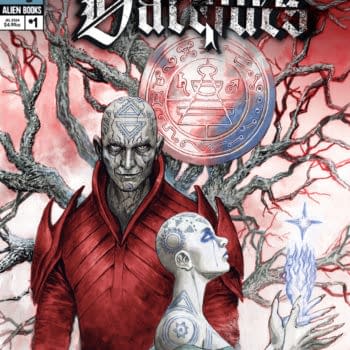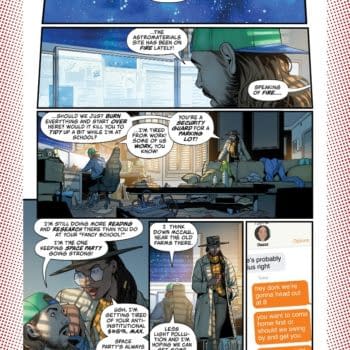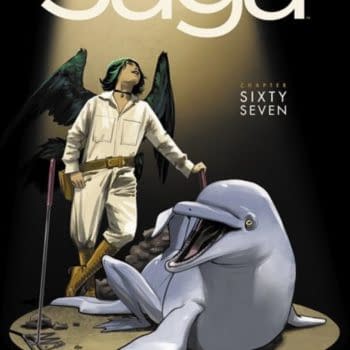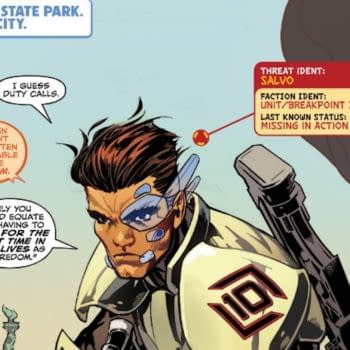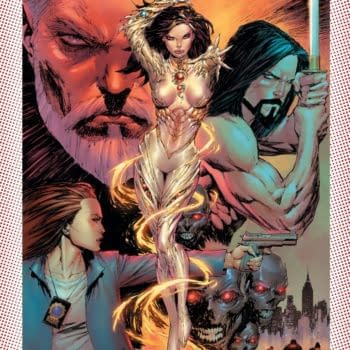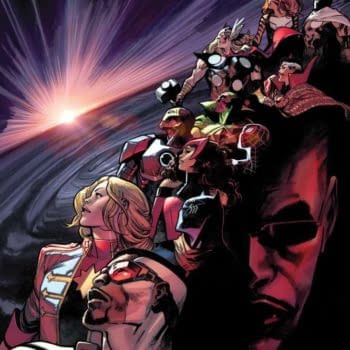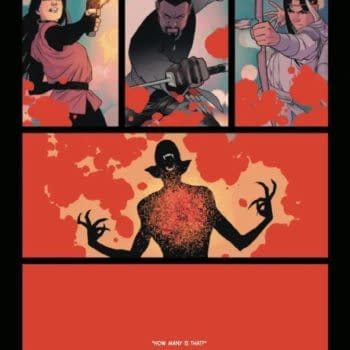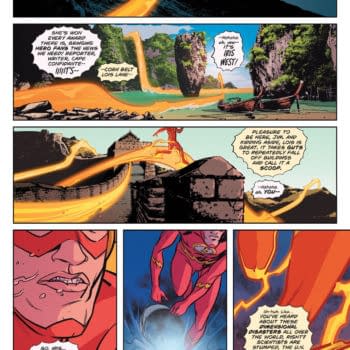Posted in: Comics | Tagged: Comics, entertainment
The DC Comic Talent Hunt Isn't What I Thought It Was – And That's Okay
by Patrick Gerard
I remember being frantically excited when I first got news of the DC Comics Talent Workshop. I had been solicited for pitches from DC editors a few times in the past but had never been able to parlay that into anything. I spent much of the 2000s pitching and developing material that didn't go anywhere, aside from a "Special Thanks" credit in an issue of Superman. The pitches that seemed the most promising were for books and backup features that were canceled. Meanwhile, I was working for magazines and blogs, pursuing two master's degrees, and building up a repertoire of live performance work; I have to admit that I always enjoyed the stage because it offered instantaneous feedback. I also began publishing my own comics over the last few years. Making comics was the only thing I'd ever been enthusiastic about doing, for as far back as I could remember.
When I began planning my trip to Los Angeles this year for Wondercon, I eagerly followed snippets of news coming out from DC, both about their then-mysterious Rebirth event and about Scott Snyder's and Bobby Chase's then-mysterious DC Talent Development Workshop.
I actually had my bags packed and was preparing to load them into my car to go to the airport when I got a late night call from my uncle, who told me I needed to come over to my father's house immediately. When I arrived, my father's car wasn't there and, I surmised, he'd been driven home by my uncle. I opened the unlocked door to find my uncle sitting in the living room and my father in a recliner, his face sunken into his hands and a box of tissues beside him. They were the only two people there.
The absence of my mother and my father's tearstains told me everything I needed to know. My 59 year old mother had been scheduled for cancer surgery the next day (with an excellent prognosis) but an undetected blood clot in her heart had claimed her before she ever made it to the table. I learned that after an intimate Italian dinner and a promising job interview near the hospital where she was to receive treatment, she collapsed in my father's arms on the way back to their hotel. In less than a minute, she was gone.
All at once, before I could even grieve, I had to decide what to do about my airline and hotel plans for Wondercon. I had an old friend meeting me out there. I had a greenlit book from a major publisher I was hoping I could work out some of the business issues on. I was eager to get every detail I could get about the DC Comics Talent Workshop and I knew that Wondercon might be the only convention I could attend this year where I'd have a realistic shot at approaching editors. At the same time, my mother's body hadn't even been released and I had no clue when the funeral was. My father was devastated and, honestly, my racing thoughts were the only thing holding me together.
My mother was a brilliant woman. She abandoned a master's degree in the 1970s with one course left, analyzing nuclear policy. She and her three sisters were all valedictorians. She knew sign language, Greek, Latin, and some French. She painted, wrote lovely poetry and eloquent prose in longhand cursive, and acted as a highly creative manager for both my grandparents' small engine repair shop and the deli she ran with my father. Juvenile diabetes had taken away much of her eyesight, damaged her lungs, damaged her heart, and nearly cost her one of her feet. She had rejected the doctor's advice to amputate her foot. She continued on when the 2008 economic crisis cost my parents their business, their house, and everything they had. She went on to get a master's degree with a perfect 4.0 average and began a new life working in libraries and archives. She took about 30 free online courses a year and read several books a week. She was a fighter who always urged me to pursue my dreams by swimming against the current.
I decided in the end to go to Wondercon and fly back early for her funeral, throwing the cost of the new return ticket on credit cards to sort out later. I had some nice chats with people at Wondercon, including Dan Jurgens and Dan DiDio. I enjoyed meeting up with tenacious up and comers like Siike Donnelly, who listeners of Rick and Morty co-creator Dan Harmon's Harmontown podcast may recognize as a stroke survivor with a prolific output of Kickstarter-financed comics. I didn't get a lot of tangible information or leads, though. I spent about half the show ducking off into alleys where I could quietly process my grief over my mother with pockets stuffed with Kleenex tissues. My seemingly greenlit book with a major publisher didn't advance any and would wind up in development hell later over rights issues.
Through the vague haze of that weekend, I came away with the impression that the DC Comics Talent Development Program was designed for people like me. People with passion and drive who have run Kickstarters and hustled with editors to get solicited for submissions. I likened it in my head to the Bizarro Comics anthology projects of the early 2000s or Karen Berger's recruitment of fresh and fringe-y voices with a profoundly weird perspective on mainstream comics in the pre-Vertigo days. I imagined this as a route for the people who would slip through the cracks of an industry that is better suited to identifying screenwriters. This talent development program, I was certain, was for the people running Kickstarters in flyover country – that vast swath of the United States far from the entertainment hubs of L.A. And New York – and for diverse and international talent, like the new generation of comics creators emerging in the Czech Republic, India, and the Arab world.
The internet proved an effective echo chamber for my grandiose ambitions. I became convinced that not only would I make the cut for the workshop but that I knew many of the people who would form my cohort in the program. This was a program, after all, for people with published credits, which should narrow the field. The website even said, "DC will only consider writers with current or past professional credits." To me, this meant bloggers who had produced comics like Newsarama's Steve Ekstrom and CBR's Hannibal Tabu. Romance novelists like Corrina Lawson. Persistent self-publishers like Tom Stillwell (whose Toyboy had taken years of labor, evolving from a black and white book) and Michael McDermott of Imaginary Drugs and Siike Donnelly. I was certain that this was the moment of glorious ascent for what I had deemed "Generation K", a wave of self-published Kickstarter talent. I could tell you not only who I thought would make the cut but what DC Comics properties they would wind up getting assignments for.
In the end, this isn't what DC Comics was looking for from its Writers' Workshop. The names released were literary award winners and screenwriters. Many of them had also run Kickstarter campaigns but they were definitely deeper entrenched in the entertainment business and further along in their careers than I had pictured, with credits that included shows on MTV and HBO. All were horror writers. Most were already based on the west coast. Most had franchise writing experience. I could imagine most of them teaching a workshop as easily as I could imagine them taking one. Ryan Lindsay was the closest to what I had imagined and he had work on My Little Pony and Vertigo: CMYK, which I gathered might have made a bigger impression than his fringe-y Deer Editor about an antler-headed crime journalist.
To be honest, Gerard Way's Young Animal imprint is much closer to what I'd imagined the Writers Workshop being like. It's weird and edgy and rough around the edges, with an idiosyncratic collection of low profile characters. I didn't think DC's Workshop was looking for the next Ta-Nehesi Coates or the next Scott Snyder – who can supply and audience and helm popular books . I didn't think people like that needed a showcase. Instead, I had it in my head that DC was looking for oddball new takes on the likes of Black Condor or The Red Bee by raw talent who need a showcase, creating a screwball R&D division of the company.
Had I known what they wanted? I might not have applied because I'm not a good fit for core, franchise books, unless you want me writing offbeat, tonally detached Superman comics in the vein of American Alien or All-Star Superman. I – at the very least – would have sought out a letter of reference that an existing DC editor who offered to write a recommendation for me; I didn't because I wanted to play up my outsider status. Still, I feel like my strengths as a writer come from having that outsider take where I'm more concerned about the meta-games I can play with the ideas from spiral dynamics and ambushing people with homages to Jack Kirby or David Lynch.
Being weird and perhaps a little incoherent has served me well enough in life so far; I'd rather be a Jim Starlin, a Steve Gerber, or a Grant Morrison type, where I could have a chance to delve into deeply comic book-y, unadaptable, quasi-satirical works, what I call "anti-cinematic comics". I have a graphic novel collection out now, Ungrounded: The First Revolution, with circulation in the thousands when you count online retailers and digital sales, and was fortunate enough to get Brian Augustyn and Tom Peyer as collaborators for short stories on it. You can buy it on ComiXology or most online booksellers. Small brag: the founder of Sequart called me a genius in his review of Ungrounded, so there's that at least. That made me smile.
2016 has had its share of disappointments for everyone. I was frankly gutted when I didn't make this program because I could use the paycheck and the exposure and because I'd placed my emotional wellness and personal life second to pursuing mainstream comics this year, with no major strides to show for it. I'll keep making comics but the wave of deaths this year, in terms of people close to me and in popular culture, makes me feel like I'm competing against a clock ticking down to zero, in terms of the mainstream breakthrough I'd always hoped for, the kind where I could have a shot at redefining an iconic character. All I can do is keep creating and keep fighting. I learned to never stop fighting from a very dear and special lady.
Still, I'm really excited to see what this slick and very mainstream cadre of skilled craftsman create once they graduate from this workshop. Knowing now what DC wanted, it makes more commercial sense to me than the pipedream I had conjured up in my head of a misfit carnival showcase of indie creators. The creators DC has selected are solid, seasoned, and skilled creators who deserve a break. Their day in the sun is here now so let's enjoy what they have to offer us.







